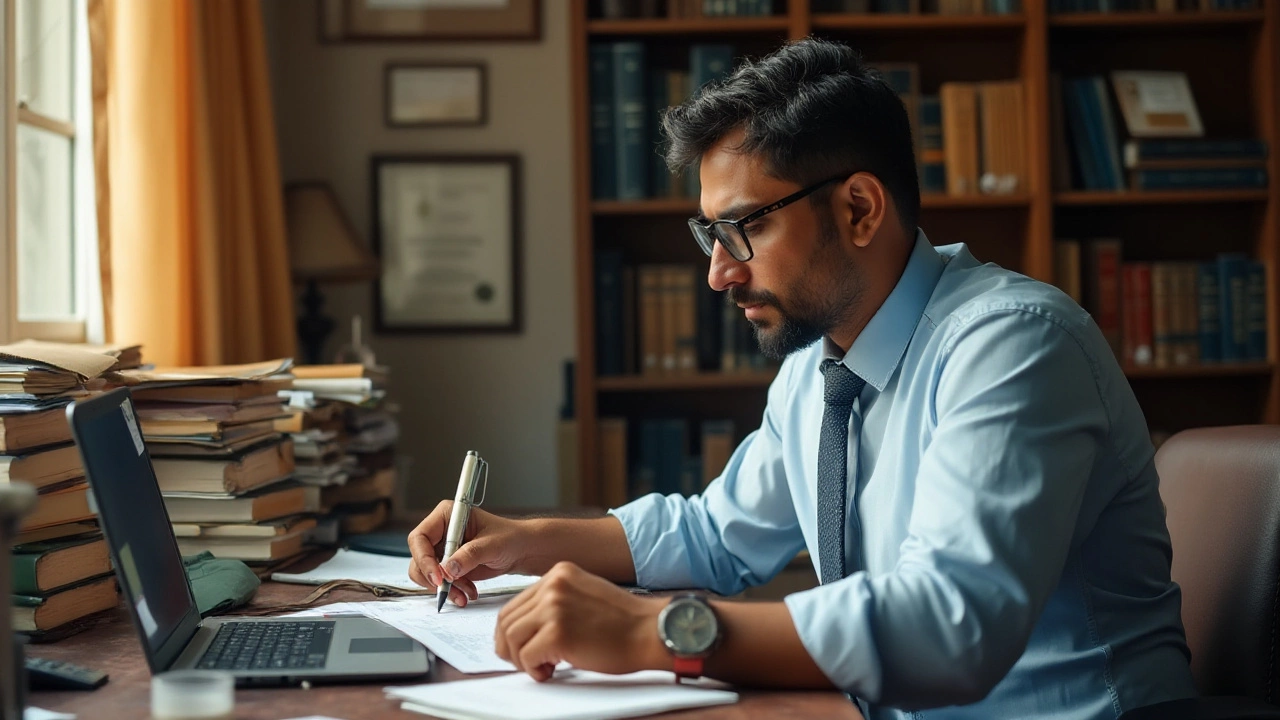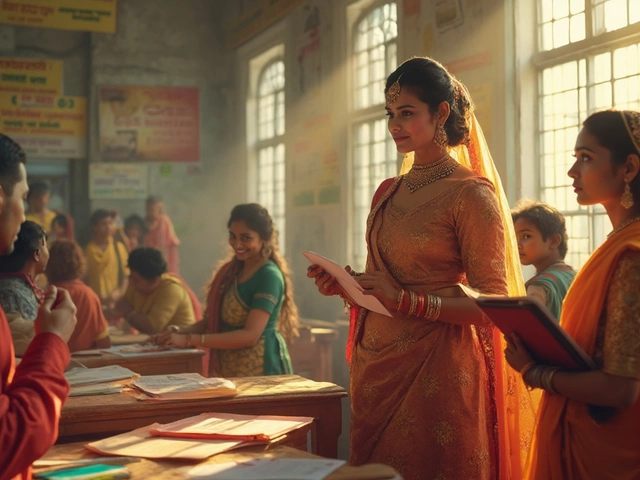In the drama-filled world of law, trial lawyers stand at the center of the courtroom’s spirited challenges. They're the gladiators in the legal arena, engaged in a battle of wits to uphold justice or defend clients. Among these, criminal lawyers frequently take the spotlight, shouldering the responsibility of defending clients accused of crimes or seeking punishment for wrongdoers.
Understanding who these lawyers are and how their trials unfold is crucial for those navigating the justice system, whether you're directly involved in a case or simply a curious observer. This article delves into the types of legal experts usually seen in trials, with a special focus on criminal lawyers, shedding light on their roles and the significant frequency of their courtroom appearances.
- Overview of Lawyers in Court
- Criminal Lawyers at the Forefront
- The Role of Defense Attorneys
- Prosecutors and Trial Frequency
- Skills Required for Trial Lawyers
Overview of Lawyers in Court
The legal world is vast and varied, comprising numerous specialists who play critical roles in the machinery of justice. Within this sphere, it's easy to get swept away by the spectrum of duties and courtroom spectacles. From the stern gaze of judges to the tense exchanges between the prosecution and defense, each participant in the court has a defined purpose. Trial lawyers, however, are the most dynamic players on this stage, often recognized for their skills in arguments, cross-examinations, and navigating complex legal documents.
These lawyers, especially those focusing on criminal cases, are always bustling about, preparing cases, gathering evidence, and strategizing the best approach for a favorable outcome. They can be divided mainly into two camps: the defense attorneys and the prosecutors. Defense attorneys represent the beleaguered defendants, putting their analytical minds to work in finding inconsistencies in the opposition's arguments. On the other side of the aisle, we have the prosecutors, who are tasked with presenting a case against the accused, representing the interests of the state or the public. According to the American Bar Association, these legal experts are not just representatives of legal arguments but also stewards of justice ensuring fair trials.
"Trial lawyers are the lifeblood of the courtroom, consistently working to maintain the balance of justice and protect the sacredness of fair play in legal proceedings." - Anonymous Legal Scholar
In handling criminal trials, these criminal lawyers often must prepare against massive amounts of evidence, strategic counterarguments, and unexpected turns that trials inherently offer. It is this unpredictability that makes their role exhilarating yet challenging. An interesting tidbit from a 2022 survey by the National Association for Law Placement revealed that about 40% of all practicing trial lawyers in the U.S. have been involved in criminal cases at some point in their careers. This showcases the critical importance of this domain within the legal profession.
The life of a lawyer who frequently goes to trial is as demanding as it is rewarding. Such attorneys need to be sharp thinkers, persuasive communicators, and relentless investigators. Preparing cases, whether for the defense or prosecution, involves sifting through case laws, meticulous research, and procedural knowledge. Yet, despite their differences, these lawyers take on cases that often set precedents, influence laws, and sometimes capture national attention, making their work not just about winning or losing but significantly about contributing to the justice system’s evolution.
Criminal Lawyers at the Forefront
When stepping into the courtroom, criminal lawyers often find themselves navigating a labyrinth of legal intricacies. Their principal role centers on defending individuals accused of violating the law or prosecuting those alleged to have committed crimes. These lawyers wear many hats, from strategist and negotiator to advocate and counselor. They are pivotal figures in the criminal justice system, tasked with ensuring that justice is fairly served for their clients, whether defending the accused or representing the state.
Criminal lawyers often participate in jury trials, which form a significant portion of courtroom activities. According to the Bureau of Justice Statistics, criminal cases comprise approximately 90% of total court cases in many jurisdictions, marking the importance of the role these legal professionals play. Trial lawyers meticulously prepare for these proceedings, investing countless hours in examining the minutiae of their cases. Preparing involves scrutinizing evidence, interviewing witnesses, and crafting compelling arguments that anticipate the opposition's strategies. The intense preparation is essential, as the stakes of these trials are high, often dealing with the liberty or even life of the accused.
In the fiery arena of legal battles, having strong communication skills is vitally important for these attorneys. They must eloquently present evidence and articulate their points, often under extreme pressure. Exceptional criminal lawyers possess an acute ability to remain calm and persuasive, ensuring their arguments resonate with juries and judges. As the famed legal scholar Alan Dershowitz once said,
"A criminal lawyer will deprive you of your freedom for speaking of it at the wrong time."This emphasizes the critical importance of timing and presentation in their work.
Moreover, defense attorneys and prosecutors approach trials with tactics tailored to their specific objectives. Defense attorneys work to challenge the prosecution's case, creating reasonable doubt about their client's guilt. They scrutinize every piece of evidence and witness testimony, always searching for inconsistencies or errors in the opposing side's case. Conversely, prosecutors aim to build a solid case that substantiates the charges against the accused. Their role is to represent the government and prove beyond a reasonable doubt that a crime has been committed by the defendant. This adversarial system ensures that both sides are diligently working toward unveiling the truth, which is a cornerstone of the judicial process.
The criminal lawyer's journey is fraught with challenges, yet their position is one of immense influence and consequence. Their work is fascinating for anyone interested in the judicial system, demonstrating both the complexities of legal proceedings and the critical need for skilled professionals dedicated to upholding the law. Whether on the side of defense or prosecution, criminal lawyers maintain a relentless commitment to serving as the stewards of justice within the courtrooms where liberty hangs in the balance.

The Role of Defense Attorneys
Defense attorneys are the cornerstone of the justice system, embodying the ideal that everyone deserves a fair defense. They stand up for those accused of crimes, ensuring that their rights are protected and that they receive a trial that adheres to legal standards. These lawyers are more than just courtroom advocates; they are detectives, negotiators, and analysts, sifting through evidence to dismantle the prosecution's case and seek justice for their clients. Each day, they must navigate the murky waters of legal statutes, offering their expertise to craft strategies that might lead to acquittals or reduced sentences.
In the intricate dance of legal defense, they often start by meeting with clients to understand their side of the story and gain insights into what might be hidden in the police reports and witness testimonies. Delving into the pre-trial stage, they analyze all facets of the case, from visiting the crime scene to reviewing body camera footage. By employing sharp investigative skills, they uncover inconsistencies or procedural errors that might undermine the prosecution's argument. Their job is not just about winning but about ensuring the law is fairly applied.
A criminal lawyer wearing the defense hat must excel in the art of communication, both in delivering powerful arguments to swaying juries and in negotiating plea bargains that serve their clients' best interests. As stated by notable jurist Alan Dershowitz,
"A lawyer's job is to keep a client out of trouble, and if in trouble, to get him out of it."This quote encapsulates the driving mission of defense attorneys, who strive tirelessly, often under immense pressure, to guard their clients' liberties against the formidable forces of the criminal justice system.
Statistics show the tangible impact defense attorneys have. According to a study reported in the Journal of Empirical Legal Studies, defendants represented by public defenders have a significantly lower conviction rate in comparison with those unrepresented. This underscores the importance of having skilled defense attorneys who can challenge evidence, call expert witnesses, and, when required, present compelling legal arguments. These courtroom tactics are not just routine maneuvers but life-altering efforts, with each decision potentially altering the course of a client's future.
Moreover, defense attorneys play a critical role in upholding democratic principles by ensuring that the burden of proof remains on the prosecution. They remind us that within the legal system, truth is not always a clear-cut verdict but often a nuanced exploration of facts and perspectives. Their work, often unseen outside the courtroom's glare, is crucial in maintaining the delicate balance of justice and liberty in society. This unheralded aspect of their role often determines how justice is administered, both in high-profile cases splashed across media and everyday ones that quietly shape legal precedent.
Prosecutors and Trial Frequency
Prosecutors play a pivotal role in the criminal justice system, often finding themselves in the courtroom as the state's legal representatives. These legal professionals are central to governmental efforts to uphold the law by spearheading criminal prosecutions. This means that their presence in trials is frequent, particularly in cases where criminal charges are contested or more severe. Having familiar faces in the courtroom, prosecutors are tasked with presenting evidence compellingly and persuasively, ensuring the jury understands the gravity of the defendant's actions. Unlike defense attorneys employed by private individuals, prosecutors are public officials, which adds a layer of societal responsibility to their work.
One major factor influencing how often prosecutors appear in court is the nature of the legal system in their jurisdiction. Certain regions prioritize plea bargains over trials, which could reduce trial frequency. However, areas with a strong inclination towards lengthy legal adjudications see an increased necessity for prosecutors to be skilled trial lawyers. According to data from the Bureau of Justice Statistics, prosecutorial offices in densely populated districts may handle thousands of cases annually, a substantial percentage of which proceed to trial due to the serious nature of the crimes involved.
Moreover, the complex dynamics of prosecutorial duties demand a wide array of skills, ranging from legal expertise to the ability to communicate effectively with both victims and defendants. Prosecutors must ensure evidence integrity and collaborate closely with law enforcement agencies, which can be a challenging task when managing multiple cases simultaneously. This multifaceted role requires not only an exceptional understanding of the law but also the ability to operate under pressure while adhering to ethical standards. An anonymous prosecutor interviewed in a legal journal remarked,
"Each case is a puzzle, a story that must be unraveled. Our job is to untangle these narratives and present a clear, honest picture to the court."
Economic factors also play a part in determining the frequency of trials for prosecutors. Budget constraints can either limit or necessitate the push towards trial resolutions. In times of austerity, court systems may pressure for more settlements out of court to conserve resources. However, in contrast, high-profile cases with significant public interest inevitably lead to trials, placing prosecutors in the limelight. The balance of maintaining justice while managing resources is a delicate dance and one that prosecutors navigate daily. The commitment to public safety while respecting defendants' rights makes this one of the most challenging yet rewarding careers in the legal field.

Skills Required for Trial Lawyers
Embarking on the challenging path of becoming a trial lawyer, especially within the sphere of criminal law, demands a unique set of skills that goes beyond mere knowledge of legal codes and statutes. At the heart of these skills is oration—the art of persuasion in speech, where the attorney must passionately convey elements of their case with clarity to a jury often unfamiliar with legal jargon. A trial lawyer's success often hinges on how adeptly they can turn complex legal concepts into relatable narratives, drawing the jury into the story they unfold, be it of guilt or innocence. This skill, not merely natural, is honed over years through practice and engagement in courtroom theatrics that demand both verbosity and succinct clarity when each holds its value.
Another cornerstone skill is acute analytical thinking, essential for dissecting case files and unearthing key evidence that may pivot a trial's direction dramatically. This involves not just poring over documents but perceiving unseen connections between disparate pieces of information. Trial lawyers champion the cause of their clients or the state on the belief that the stories they construct from such evidence form the bedrock of a tenable case. They often grapple with the intricate details presented in vast documents, requiring a sharp prowess in analyzing and interpreting these details accurately. Such skills are indispensable, particularly when the stakes involve someone's liberty or public safety.
Effective trial lawyers are also masters of strategy, capable of devising and adapting plans as a case unfolds under the dynamic conditions of the courtroom. Flexibility in strategy allows them to be nimble in responding to unforeseen developments, such as unexpected testimonies or new evidence emerging mid-trial. This skill, combined with the indispensable ability to negotiate and compromise where necessary, often plays a pivotal role in courtroom dynamics. An attorney's adeptness at steering these strategies to align with the legal frameworks and ethical standards is crucial for achieving desired outcomes while maintaining respect and integrity within the legal community.
“As a trial attorney, you have to think and act quickly—what I call, ‘Think On Your Feet,’ because the courtroom is an unpredictable place,” said renowned attorney Robert Shapiro.
Communication extends beyond verbal artistry to encompass the nuanced realm of body language. Mastery of courtroom demeanor ensures the lawyer conveys confidence and credibility, ingredients vital for gaining trust and reinforcing the validity of their arguments. Nonverbal communication, such as the firm handshake or a steadfast posture, can subtly influence perceptions and, by extension, the trial's outcome. Trial lawyers must continuously refine these subtleties to resonate effectively with jurors and judges alike, who often draw subconscious conclusions based on a lawyer's comportment during proceedings.
Lastly, in this digitized era, proficiency with technology is increasingly significant. Courts rely on digital screens for presenting evidence, and understanding the assorted software and tools for managing documents, depositions, and visual aids can provide strategic advantages. Lawyers adept in integrating these technologies are better equipped to manage the voluminous information characteristic of modern trials, allowing for efficient and effective case presentations. These technological skills, alongside the traditional competencies of evidence management and procedural law, round out the key capabilities required for today's trial lawyers.


